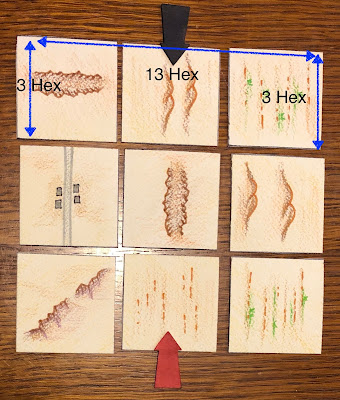 |
| A game in progress |
 |
| Air support |
- Pre-battle events impacting the force deployment and unit availability
- Deciding scenario objectives
Pre-Battle Events
When deciding upon the pre-battle events roll a dice for both players and on a score of:1-2 Interdiction
Enemy air support has attacked and delayed important supplies and the arrival of reserves. 20% of the force (rounding down any fractions) must be removed. The units removed cannot be of all one unit type and must include a variety of types. For example: tank, armoured cars, infantry, AT guns, Artillery.
The opposing force will not have any air support available during the game as it was directed to interdiction activities. However, air support is available to the side impacted by interdiction.
3-4 Defence in Depth
The defence has held back part of its force in reserve ready to be deployed to bolster a defensive line or form part of a counterattack. 30% of forces (rounding fractions down) are to kept in reserve, They cannot include artillery units.
The reserves can be deployed any time after turn 4 on a successful dice score of 4+. They arrive on the players base edge or rear flanks (see photo below).
 |
| Reserves can arrive on a players based edge (13 hexes) or rear flank (3 hexes). The tabletop is 13 hex wide and 10 he deep. |
The attacking force is able to make a flanking attack. 30% of the forces (rounding up fractions) are involved in the flank attack. The flanking force cannot contain any artillery units.
The flanking force can be deployed any time after turn 5 on a successful dice score of 4+. They arrive on either flank but not on the last 2 rows on the defenders base edge (see photo below).
 |
| A flanking force can arrive on either flank, but not close to the defenders base edge. The side edges on my tabletop measure 10 hexes. |
Deciding Scenario Objective
Between 1 to 3 scenario objectives are now assigned to key terrain features. The tabletop is divided into 3 rows from one side to the other aligned to the terrain cards. In each row 1 objective can be placed using the following rules:- Place objective on hill (when placing the 3 hills in a zone 2 are always placed adjacent)
- Place objective on Escarpment
- Place objective on town
- Hills take priority over escarpments, which in turn take priority over towns
- If none of there above are terrain features in a row, then no objective is placed
- If 2 hill features are in a row dice to see which is the objective
See example below...
 |
| A tabletop showing the zones and 3 objectives |
Great - readin this is really helping in the lodkdown. Already looking forward to the next chapter! May order some 1/600 mdels soon.
ReplyDeleteCheers
Simon
Thanks. The next post should be of the opening game of campaign turn 2.
DeleteThanks. Will that include your Tank on Tank variant? Also, whose miniatures are you using for this?
ReplyDeleteKind regards
Simon
I will be posting a list of the variants to the tank on tank rules.
DeleteFascinating, Peter, you've really got a fully-developed set of rules (procedures?) for translating the campaign map to table-top fights. Very impressive!
ReplyDeleteV/R,
Jack
Procedures are be a good term, rather than rules. Thanks.
DeleteYou bet! Keep'em coming, now that I understand how you've arrived on the table, I can't wait to see how it goes ;)
DeleteV/R,
Jack